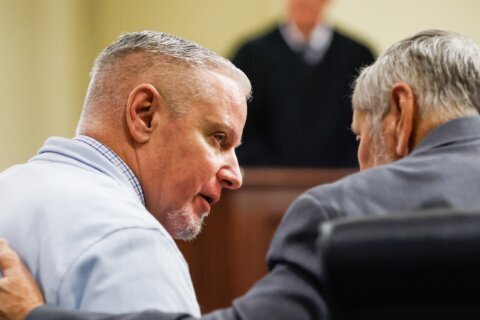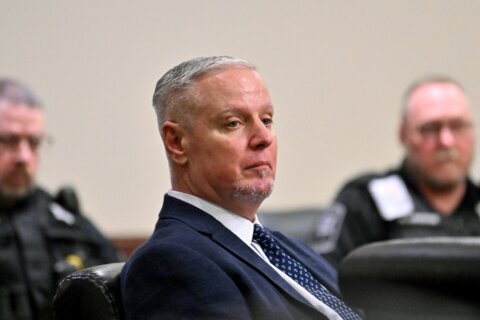In response to a controversial Virginia state law, Prince William County’s school division was one of two districts to recently release a list of books deemed “sexually explicit.”
Under new guidelines, parents would be allowed to opt their children out of learning about these texts — should teachers decide to include any of them in the class curriculum.
According to the state code, “sexually explicit content” means any description or visual depiction of a lewd exhibition of nudity, sexual excitement, sexual conduct or sadomasochistic abuse, sexual bestiality, coprophilia, urophilia or fetishism.
But the Prince William County Education Association, the area’s teachers’ union, believes that definition leaves a lot of wiggle room, which constitutes a type of censorship.
“It is subjective and largely open to interpretation,” said Jerod Gay, with the association.
Gay, who previously taught 7th grade language arts in the county, currently works as a full-time release officer for the association and is a member of its collective bargaining team. That group is currently in negotiations with the school division.
Gay said that last year, well before this year’s list was revealed, the division started notifying language arts teachers and librarians about a new policy coming down the pipeline. Even so, he said, some were still surprised when the county’s suggested reading materials list came out.
The list in Prince William County contains more than 100 titles, including several that many consider staples, such as “Beloved” by Toni Morrison and “Slaughterhouse-Five” by Kurt Vonnegut. Also flagged as sexually explicit are the “The Canterbury Tales,” several Tennessee Williams plays, the works of Sophocles and the 2010 book “The Other Wes Moore” written by Maryland Gov. Wes Moore.
‘Another instance of limiting teacher autonomy’
Gay told WTOP that it seemed to him, and several of his colleagues, that the county’s list especially targeted references to homosexuality.
“It is another instance of limiting teacher autonomy,” he said, “and the ability to broaden a student’s perspective or give them insight into content that exposes them to perspectives or experiences of people different from themselves.”
Gay added, “There’s great value in that. That’s why we educate our children.”
Gay said the policy impacts students’ educational experiences while signaling to teachers and staff that, despite their work as professionals, they aren’t trusted to make responsible decisions about the books students access in schools. He also said the list assumes that “without this level of intrusion into their time, energy and autonomy,” school system teachers may “push sexually explicit material onto students, or groom them” somehow.
“That insinuation is not only insulting, but it’s a near impossible task for teachers to go through each text page by page on top of regular lesson planning, which is why many are opting out of including any optional texts at all in their classrooms,” Gay said.
According to Gay, many teachers have since resorted to removing their classroom libraries altogether — a move that Prince William County Public Schools Director of Communications Diana Gulotta suggested teachers did not need to make.
“It is very unfortunate that some teachers may have removed their classroom libraries based on the new state law,” Gulotta said in an email to WTOP. “It is important to note that the new law doesn’t prohibit the use of items on the ‘sexually explicit materials’ list.”
New process would be ‘a headache’
Gay told WTOP it’s the position of many in the association that this policy could negatively impact instruction through its implementation.
Under the new policy, if teachers choose to use an optional text (a text that’s on the “sexually explicit” list) in their instruction, they have to send a letter home to parents notifying them of their text selection. In that letter, which must be sent at least 30 days before students use an identified text, teachers must explain in detail the nature of the content that parents may find objectionable.
“Teachers may use those items as long as they follow the review, identification, and notification process,” Gulotta said in the email.
Parents then have the opportunity to opt their child out, and if they choose to do so, the teacher must supply an entirely new additional text for opted-out students not on the “sexually explicit” list.
“That might sound reasonable to parents at first because this list says it’s all books that are ‘sexually explicit,’ but the fact is some of these books don’t have much objectionable material at all,” said Gay.
As an example, Gay told WTOP about a text he taught for years in language arts during lessons on figurative language.
The piece — “The Rose That Grew from Concrete,” a poem by rapper Tupac Shakur — appears on the list amid a collection of poems in a book written by the artist.
“The poem is very short and there is absolutely no sexual content in it. All it does is use the metaphor of the rose growing from concrete to illustrate the rise of people from humble beginnings,” Gay told WTOP. “No one in a million years would read this poem and think there’s anything sexual in it. It’s about a rose. And yet it’s now on a list that says it’s ‘sexually explicit.'”
WTOP asked the system to respond to claims that Tupac Shakur and now-Gov. Wes Moore’s titles don’t appear to explicitly meet the sexually explicit materials criteria laid out by the school board’s policy and regulation.
“Unfortunately, I don’t have the specific reasons why each item was chosen readily available to me at this time,” Gulatta told WTOP in the email.
Gay said that going forward, he’d likely leave this poem out of his lesson plans because “the entire process would be too much of a headache.”
Gulotta told WTOP that the law, which impacts schools across the commonwealth, led to the creation of a review and appeal process for texts in Prince William County schools. Those hoping to challenge any book’s reason for being added or removed from the county’s list can fill out a form, and spark a review process.
Teachers ‘overwhelmed and underappreciated’
Gay said many of his colleagues fear this new policy could also impact teacher recruitment and retention at a time when the county is already struggling to fill vacancies.
“Going into this year, the division has more than 500 open positions listed,” he said. “Last year, at its highest point, that number reached almost a thousand.”
The fact that the system is in the middle of a collective bargaining agreement also makes the policy loom even larger, he said.
“If (the division is) going to require that level of extra work from teachers when it comes to vetting and looking through these texts for even a sentence of objectionable material, then it is incumbent upon them to be far more specific, in terms of how they are defining (‘sexually explicit’), and give concrete examples,” Gay said.
“We also want to know that any additional time teachers are going to be spending fulfilling these duties will be compensated fairly,” he added. “That’s incredibly important to us.”
Even if the teachers’ union and district come to a fair compromise, Gay said he still anticipates many teachers taking vast amounts of uncompensated time to thoroughly vet books for fear they could be penalized if they miss even one paragraph a parent could complain about.
“This policy in particular has only added more confusion, more frustration, and more of a feeling of being overwhelmed and underappreciated in the staff of Prince William County,” he said.
WTOP’s Ivy Lyons contributed to this report.








